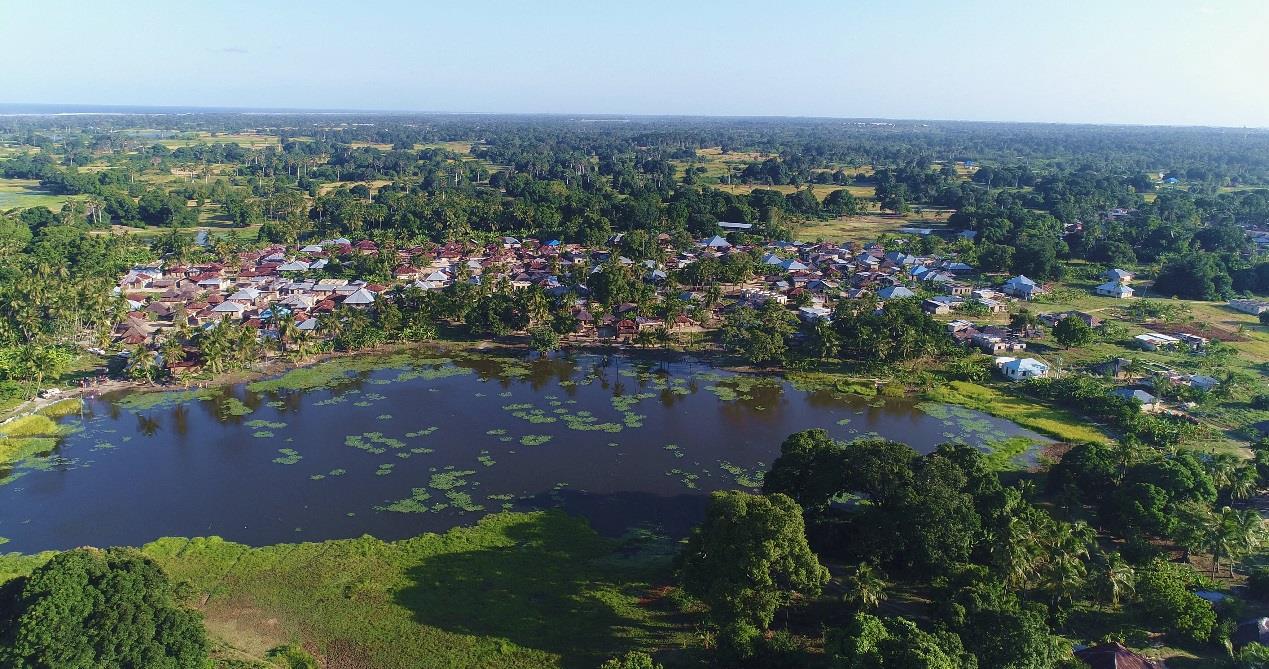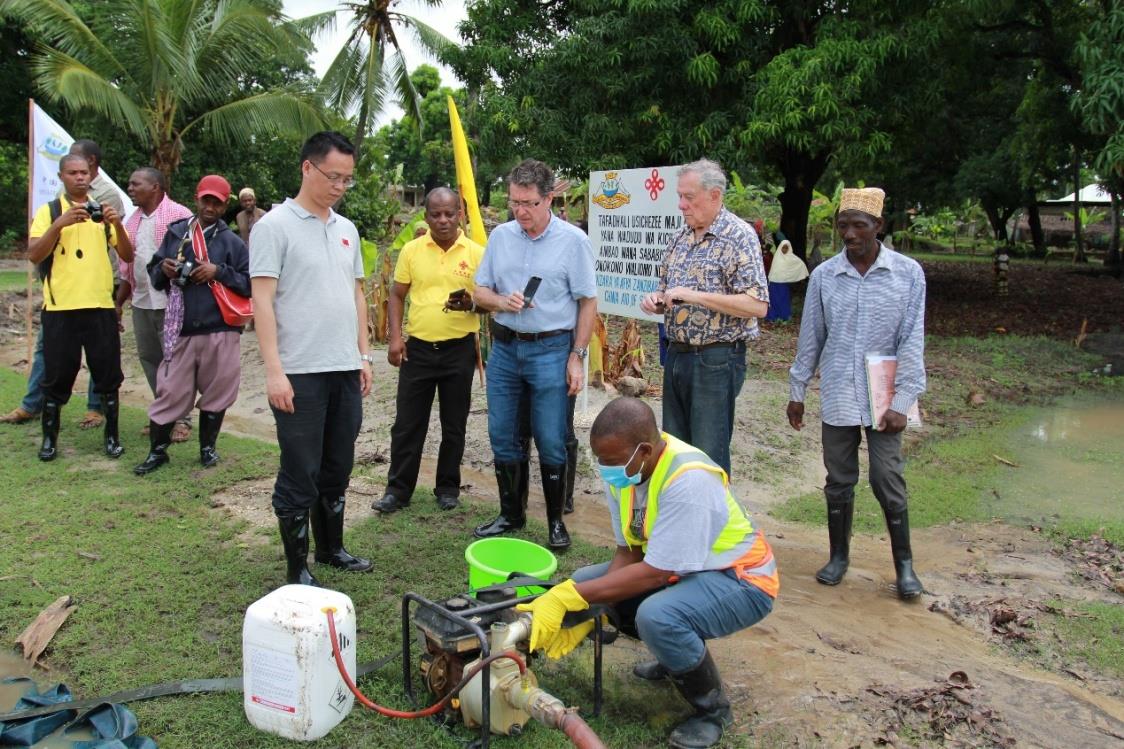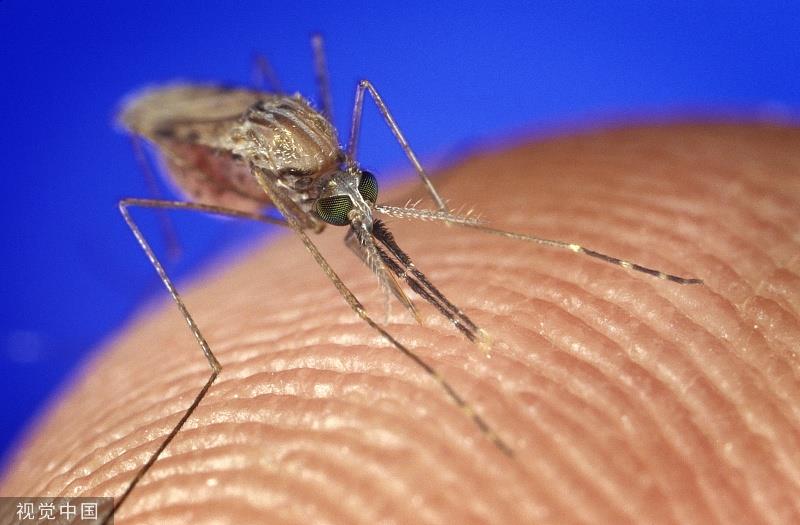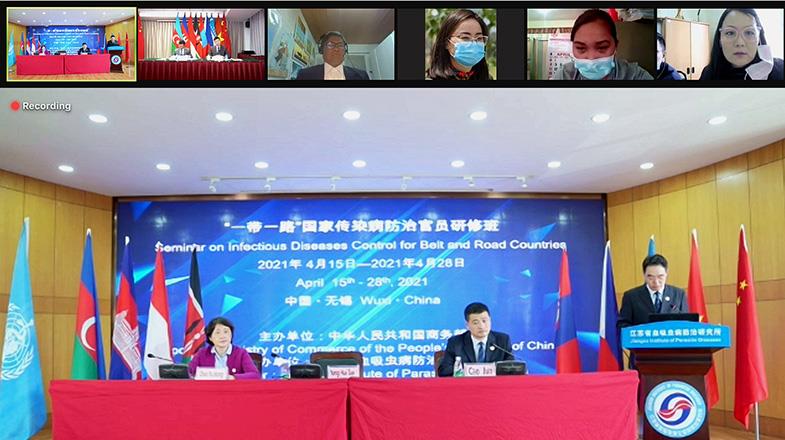In April, Zanzibar Island in Tanzania, which is located on the east African coast near the equator, is in the long rainy season. This season is a rare comfort period for the residents of the island, but it also hides health risks.
Saleh Juma, a disease control expert in the planning department for prevention and control of tropical diseases in Pemba, the Ministry of Health of Zanzibar, is conducting health education with the theme of "healthy water use and schistosomiasis prevention" in schools in Mtangani village, the port town of Mkoani, Pemba Island, Zanzibar. After entering the rainy season, the ponds on Pemba Island became full and the number of ponds began to increase. At this time, the prevention and control of infectious diseases and propaganda work must keep up, because these ponds are likely to harbor an accomplice of schistosomiasis japonica — — Blister snail
The vector water snail is the intermediate host of schistosomiasis in Egypt. It is difficult to find the blister snail in dry season, but it appears in ponds, rivers and streams in rainy season. People are prone to get sick when they come into contact with water containing blister snail infected by Schistosoma japonicum. This is very dangerous for children who like to play in the water.
What Saleh Juma told the students this time is mainly the importance of safe water use, what the blister snail looks like, and what symptoms need medical treatment … … The classic practices of safe water use, disease investigation and treatment, and vector snail control in the comprehensive management of schistosomiasis prevention and control in China have been transferred to local public health institutions through the China-Africa health cooperation project, which has played an important role in effectively controlling the epidemic of schistosomiasis and achieving the goal of schistosomiasis elimination.
China’s Trinity Model Helps the Prevention and Control of Schistosomiasis in Africa.

Ponds on Pemba Island in Zanzibar (provided by the respondents)
Schistosomiasis is prevalent in 78 countries and regions in tropical and subtropical regions. The World Health Organization classifies schistosomiasis as a "neglected tropical disease", which is the second largest parasitic disease in the world after malaria. According to the World Health Organization, in 2020, about 800 million people in the world will live in endemic areas of schistosomiasis, and 241 million people will need treatment, of which more than 90% will be in Africa, and the infection situation will be particularly serious in poor communities without access to safe drinking water and adequate sanitation facilities. Zanzibar is a severe endemic area of schistosomiasis.
In 2011, the survey results of 24 schools in Pemba Island of Zanzibar showed that the average infection rate of schistosomiasis was 15%. Saleh Juma recalled the schistosomiasis epidemic in Zanzibar: half the children in some families were infected with schistosomiasis, and most hospitals did not have the ability to diagnose and treat schistosomiasis. Although some children have been treated with drugs, they are extremely lack of health knowledge, and the water vector blister snail has not been effectively controlled, so they are infected with schistosomiasis again when swimming and playing in the water. Although the World Health Organization calls schistosomiasis in Egypt a neglected tropical disease, its harm is not small. Its adults are mainly parasitic on human bladder tissue, which can lead to hematuria, dysuria, hydronephrosis and renal failure, and even cause canceration of bladder tissue, seriously affecting development and reproduction. "Every time I see children in Zanzibar suffering from this disease, I feel very sad." Saleh Juma said.
Since 2003, many international organizations, such as Zanzibar Elimination of Schistosomiasis Transmission (ZEST), have carried out research on schistosomiasis control in Zanzibar in order to help local people achieve the goal of eliminating schistosomiasis. Yakub Shoka, Health Department of Pemba Island, Zanzibar, said that although international aid organizations have been here for many years to control the epidemic, the infection rate of schistosomiasis is still repeated, and it is difficult to control it to a low level. "As a developing country and region, at that time, we very much hoped to get China’s help to rescue the people in the epidemic area who were in dire straits."
In 2013, an expert group on schistosomiasis control in China came to Zanzibar to investigate the local schistosomiasis epidemic, and then China, Zanzibar and the World Health Organization signed a memorandum of understanding on the cooperation project on schistosomiasis control in Zanzibar in 2014. In 2016, Jiangsu Institute of Schistosomiasis Control undertook the technical cooperation project of schistosomiasis control in Zanzibar aided by China, which opened the first exploration of health cooperation between China and international organizations in African countries. 2017— In 2020, China provided financial and technical support and sent a total of 30 people to Zanzibar to carry out technical cooperation projects on schistosomiasis control.
"There are 5 Chinese experts in each batch, and they will work together with more than 20 of our technicians on the spot." Saleh Juma said, "We have a hot climate here, and water and electricity are often cut off. At the beginning of the project, some of our colleagues were worried that China experts could not adapt to the environment here, but six groups of China experts fought side by side with them, went deep into the front line, overcame all difficulties, and carried out a series of work covering the whole island of Pemba, such as schistosomiasis screening and treatment, snail detection, environmental transformation, information system construction, health education, etc., which really made us feel the "truthfulness, truthfulness, closeness and sincerity" of China experts. In the past three years, the infection rate of schistosomiasis in the demonstration area has dropped from 8.92% to 0.64%, and the health awareness of residents has also been greatly improved, achieving the goal that other international organizations have not achieved in the past 10 years. We are all excited to achieve such good results. "
"The key to this achievement is that we have implemented a Chinese-style comprehensive schistosomiasis control strategy here." Yang Kun, deputy director of Jiangsu Institute of Schistosomiasis Control and head of China’s technical cooperation project on schistosomiasis control in Zanzibar, said that before the arrival of experts from China, the prevention and control of schistosomiasis in Africa mainly implemented chemotherapy for the target population based on international aid, but comprehensive prevention and control measures such as media control, environmental improvement, safe water use and health education could not be universally implemented. "
There are six kinds of schistosomiasis parasitic on human body, among which Schistosoma japonicum, Schistosoma mansoni and Schistosoma aegypti are the most prevalent, and people are generally susceptible. At present, there is no specific vaccine. The article published in China Journal of Parasitology and Parasitic Diseases, Scientific Basis of Schistosomiasis Control Strategy in China and Prospect of the Tenth Five-Year Plan, points out that Schistosoma japonicum is one of the major public health problems in China, with a recorded history of more than 2,100 years. In the early days of the founding of New China, there were 11 million patients nationwide, and nearly 5 million people were infected with schistosomiasis in 38 counties in Jiangsu and Zhejiang provinces in the lower reaches of the Yangtze River. After effective control, remarkable achievements have been made in schistosomiasis control in China, and all endemic areas of schistosomiasis have reached the transmission control standard. Yang Kun said: "Jiangsu Province, as one of the provinces with the most serious schistosomiasis epidemic, has always adopted a comprehensive prevention and control strategy of paying equal attention to the source of infection and snail control, and relied on new technologies such as snail control drugs, rapid diagnostic screening, information management, and agricultural and water conservancy environment renovation projects obtained by scientific and technological innovation. The epidemic situation of schistosomiasis in Jiangsu Province has continued to decline steadily, achieving the goal of blocking the spread of schistosomiasis in 2019, and now there have been no local infected patients for 14 consecutive years. Now experts from China have brought this experience to Africa, organically combined China’s experience, local demand and international rules, and successfully landed in Africa, and the control effect has been highly affirmed by the local government.The tripartite cooperation project on schistosomiasis control among China, the World Health Organization and Zanzibar has been written into the White Paper on China’s International Development Cooperation in the New Era. "

The World Health Organization evaluation expert group evaluated the field vector control of schistosomiasis aid in mulberry (provided by the interviewed institutions)
"Thank you for sharing! In the past three years, it has played a better demonstration for us to eliminate schistosomiasis. " The then Tanzanian President of Zanzibar Sheikh said that the government and people of China have provided many selfless assistance to Zanzibar, and the schistosomiasis control project is another important achievement of long-term friendly cooperation between Zanzibar and China in the medical and health fields. "Public health foreign aid projects such as China’s technical cooperation project for schistosomiasis control in Zanzibar not only effectively controlled the epidemic situation and promoted the construction of disease control system, but also controlled the disease vectors, improved the healthy drinking water environment of local people and produced comprehensive social effects. More importantly, the practical experience of China-Africa health cooperation has participated in the formulation of relevant guidelines and international rules of the World Health Organization, which has provided important support for other developing countries in the world to control and eliminate tropical diseases and made important contributions to promoting China’s participation in global health governance. " Guo Jiagang, technical officer of the World Health Organization, said.
Malaria prevention and control "it is better to teach fish than to teach it to fish"

Anopheles mosquitoes are vectors of malaria.
Malaria is a major public health problem in Africa. According to the World Malaria Report 2022 released by the World Health Organization, in 2021, about 95% of the global malaria cases occurred in Africa, resulting in about 593,000 deaths, accounting for 96% of the global deaths. Malaria has been eliminated in our country. On June 30, 2021, the World Health Organization issued a press release saying that China was officially certified by WHO to eliminate malaria. This not only greatly reduced the "map" of global malaria distribution, but also boosted the confidence of global malaria eradication.
Since 2000, the World Health Organization has taken artemisinin as the first choice of antimalarial drugs. Scientists in China, represented by Tu Youyou, found and extracted artemisinin from Chinese herbal medicines through a lot of experiments, which successfully saved the lives of tens of millions of malaria patients around the world and accelerated the process of global malaria control and elimination. Today, artemisinin-based combination therapy has become the standard anti-malaria treatment recommended by WHO.
In the long-term struggle against malaria, in addition to the development of artemisinin, China has also improved the malaria vector monitoring and plasmodium drug resistance monitoring system, formulated the working strategy of "clue tracking, counting and pulling out the source", and explored and summarized the "1-3-7" working standard. Caojun, director of the WHO Cooperation Center for Malaria Eradication Research and Training and director of Jiangsu Institute of Schistosomiasis Control, introduced that the "1-3-7" working mode was used to control the risk of secondary transmission caused by malaria, that is, case report was made within one day, case review and epidemiological investigation were completed within three days, and epidemic investigation and disposal were carried out within seven days. This model has been popularized all over the country, and as a typical "China experience", it has become a model of global malaria eradication, and it has been formally written into WHO’s Monitoring, Supervision and Evaluation of Malaria Eradication and has been popularized and applied worldwide. The article "malaria-free certification in China: achievements and lessons learned from the national malaria elimination programme" points out that China has launched malaria control cooperation projects in Africa and Southeast Asian countries under the framework of the "Belt and Road Initiative", such as China — English — Pilot project of malaria prevention and control in Tanzania,On the basis of the "1-3-7" work standard, the strategy of "1,7-MRCTR" (Malaria reactive community-based treatment approach) was explored to effectively reduce the local malaria burden.
China has actively carried out cross-border joint prevention and control of malaria with developing countries in Africa and other places, extensively promoted international anti-malaria cooperation, and adopted technical training courses or on-site demonstration projects to further popularize China’s experience. On August 18, 2021, the seminar for malaria prevention and control officials in French-speaking African countries was held at the designated foreign aid training unit of the Ministry of Commerce — — Jiangsu Institute of Schistosomiasis Control started classes. The 14-day seminar was attended by 62 participants from seven developing countries, including Burundi, Senegal, Democratic Republic of the Congo, Gabon, Mauritius and Mali. At the same time, they received courses on malaria and other infectious diseases, and had the opportunity to communicate with antimalarial drug manufacturers in China online.

"One Belt, One Road" seminar for national infectious disease prevention and control officials is given online (provided by the respondents)
"Thanks to China for providing the opportunity and platform," said Lemson, a health official in the local office of the World Health Organization and an African student who had participated in malaria training here. Here, I not only listened to the theoretical lectures of well-known malaria experts in China, but also received practical training on malaria prevention and control technology, which helped me to carry out malaria prevention and control work after returning to China. "
Since being recognized as the designated foreign aid training unit of the Ministry of Commerce in 2002, the prevention and research personnel of Jiangsu Institute of Schistosomiasis Control and WHO Cooperation Center for Malaria Eradication have provided professional technical training with malaria as the main content for 2,066 students from more than 80 countries along the Belt and Road, including Laos, Philippines, Bangladesh, Pakistan, Sri Lanka, Nepal and Mongolia. In addition, they also launched the "One Belt, One Road" national infectious disease prevention and control training program with schistosomiasis, AIDS, Covid-19, etc. and the cultural exchange course to deepen China-Africa friendship.
Caojun said that China experienced the process from "foreign aid" to "foreign aid". In recent years, China-Africa health cooperation has gradually expanded from the clinical level of sending foreign aid medical teams and donating medical equipment or drugs to the public health level, paying attention not only to the health situation and disease diagnosis and treatment in Africa, but also to the prevention and control of diseases, the construction and strengthening of public health system and capacity. Carrying out foreign aid work for common infectious diseases such as malaria and schistosomiasis not only enables African counterparts to learn relevant prevention and control knowledge, but also injects fresh blood into their local public health system construction.
China-Africa health cooperation can be expected in the future
From the "Ten Cooperation Plans" of the Johannesburg Summit of the Forum on China-Africa Cooperation in 2015, to the "Eight Actions" of the Beijing Summit of the Forum on China-Africa Cooperation in 2018, which proposed to jointly implement health actions with Africa, and then to the "Nine Projects" of the Eighth Ministerial Conference of the Forum on China-Africa Cooperation in 2021, China-Africa health cooperation has kept pace with the times and deepened. This year marks the tenth anniversary of the "Belt and Road Initiative". At this important time node, the "Belt and Road" China-Africa health cooperation has ushered in more development opportunities.
Eliminating tropical diseases is a common challenge faced by many African countries. China and Africa need to start with problems and weak links and strengthen cooperation in the field of public health. Wang Yun Ping, a researcher at the Health Development Research Center of the National Health and Wellness Commission, said that in the past three years, African countries have realized the importance of strengthening the construction of their own public health systems, especially the ability to monitor infectious diseases and detect public health laboratories, strengthen primary health care services, develop digital medical and health infrastructure, promote the local production of medicines, and improve public health governance, and hope to cooperate with China at more levels in the field of public health.
How to deepen China-Africa health cooperation? Ming Xu, director of the Department of Global Health of Peking University College of Public Health and vice president of the Institute of Global Health Development, told the reporter that on the one hand, human resources training such as health aid can be carried out in China to build a force that will never leave. At the same time, let more public health projects go abroad, and carry out more "small and beautiful" projects in Africa, such as malaria and schistosomiasis aid, which are easy to practice and promote in other regions. In addition, in promoting the localization of China-Africa public health cooperation, China can continue to increase its support for the localization capacity building of drug production. For example, support to speed up the pre-certification of China’s enterprise products, promote the integration process of African pharmaceutical product supervision, and help China’s industrialization with African localized production.
From infrastructure, materials and sending medical teams to technical cooperation, we will help African countries improve the independent development capacity of their health systems. Wang Yun Ping said that in order to achieve high-quality health cooperation between China and Africa in the future, it is necessary to return to the original intention of South-South cooperation of "uniting for self-improvement and independent development", and under the guidance of the principle of win-win cooperation and the correct concept of justice and benefit, to further increase exchanges and cooperation in public health technology cooperation and public health management and policies, so as to help African countries improve the independent development capacity of medical and public health systems and realize common health safety and common healthy and sustainable development of mankind.
Innovate the research and application of China-Africa health cooperation mechanism, technology and products. Ming Xu said that on the basis of the bilateral dialogue on health cooperation between China and Africa, the multilateral cooperation mechanism should be further strengthened, and exchanges and cooperation with the World Bank and international non-governmental organizations (NGOs) should be emphasized. At the same time, accelerate the research and application of gene sequencing, artificial intelligence, real-time diagnosis, biosensors, virtual reality, telemedicine and other technologies, and support enterprises to provide products with reasonable prices, reliable quality and international compliance for African needs.
"Ten years later, China’s technical cooperation project on schistosomiasis prevention and control in Zanzibar has helped us improve the level of disease prevention and control, and made our country and people deeply understand the experience of Dr. China and China … …” Saleh Juma said, "I heard that China will launch a new round of technical cooperation projects to assist Zanzibar in schistosomiasis control in the second half of this year, and I look forward to their arrival. We are closer to the goal of eliminating schistosomiasis." (Reporter Zhang Ke Yi Zhao Yanling, intern reporter Huang Jiong Rui Meng-Di Zhang, designer Yan Ni, proofreader Liang Yaqin)